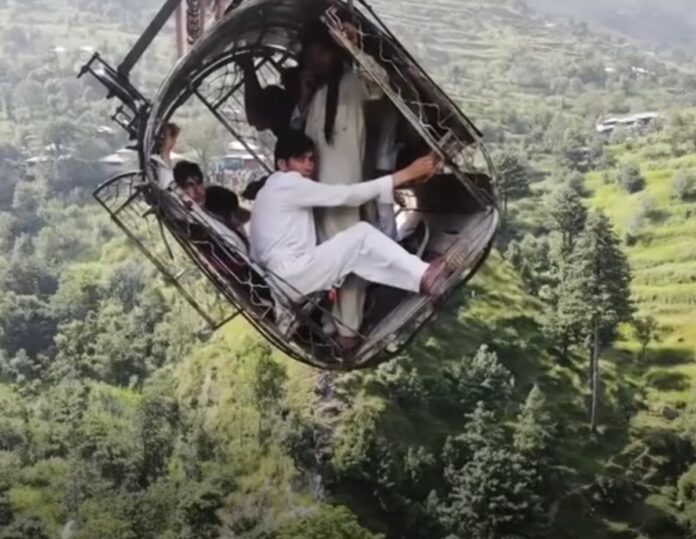Terrifying drone footage has emerged of eight passengers, most of them children, clinging on for dear life while being trapped inside a cable car left dangling 900ft above a ravine in Pakistan . The individuals – including at least six children – were stranded above the deep ravine for almost an entire day in the country’s Battagram area after one of the cables carrying the rickety car snapped at around 7.30am local time on Tuesday. A 15-hour rescue operation unfolded, in which helicopters and zipliners were used. All those trapped inside the cable car were ultimately rescued in the incident that gripped the nation and made international headlines. Now, new drone footage has revealed a close-up of the stranded cable car with the eight passengers holding on for support and huddled towards one side of the car that was still held intact by one of the cables. The footage shows the rusted body of the cable car, which had no doors on one side and from the other, the doors seemed to be open. The eight passengers – identified as Niaz, Attaullah, Usama, Ibrar Ahmed, Rizwanullah, Gul Faraz, Sher Nawaz and Irfanullah – look cramped in the space inside the cable car. It was unclear who took the video using a drone. Late on Tuesday, when the rescue operation involving helicopters and zipliners finally brought home the last of the stranded students, relief washed over the community as families broke into hugs and slogans of ‘God is great’ reverberated through the valley. One villager, identified as Janahzaib, told The New York Times : ‘In that very instant, our comfort was found solely in our prayers. The entire valley is now filled with joy.’ While cable cars present a practical solution for lack of conventional infrastructure in certain regions of Pakistan, safety concerns remain. In 2017, an illicit cable car in Murree, Punjab, crashed, claiming the lives of 11 passengers. Just last December, a cable car mishap occurred in Abbottabad, Khyber Pakhtunkhwa, where a rope snapped and 12 children were stranded and had to be rescued. On Tuesday, when the rescue operation was ongoing, the community that had seen several cable car accidents in the last few years felt like ‘doomsday’. One of the relatives of a stranded Pakistan student was quoted as saying by the BBC that ‘it was like doomsday for the area’. Youngsters who were trapped in a broken cable car, receive first aid following their rescue, in Pashto village, a mountainous area of Battagram district in Pakistan’s Khyber Pakhtunkhwa province ‘Everyone rushed out of their homes. A kid from almost every household was here,’ Fahim Udin Shah said. The cause of the malfunction that risked the lives of at least eight individuals is still unknown. On Wednesday, local authorities in Battagram geared up to undertake repair work of the malfunctioning cable car. Pakistan’s caretaker prime minister Anwaar-ul-Haq Kakar said he ordered authorities ‘to conduct safety inspections of all such private chairlifts and ensure that they are safe to operate and use’. ‘I thought it was my last day and I will be no more,’ Attaullah Shah, one of the stranded passengers on the cable car, was quoted as saying by AFP. The 15-year-old, one of the seven students who was trapped, expressed gratitude for having survived the incident. ‘God has granted me a second life,’ he said. Army commandos, aided by civilians, used helicopters before high winds and falling darkness forced them to be called away on Tuesday, and then a zip line to bring the eight people on board to safety. At least six children, aged between 10 and 16, were inside the apparatus, though accounts from officials differed on whether there were two adults, or one adult and another student , in the cable car. Fifteen-year-old Usama Sharif said: ‘I had heard stories about miracles, but I saw a miraculous rescue happening with my own eyes.’ Gul Faraz, aged 20, said he was the one to raise the alarm by ringing his parents. ‘It is an unforgettable day,’ he told reporters, adding that he was unsure whether he would make it home. Mr Faraz called his family first, and then national television channel Geo News, whose coverage quickly drew the attention of the world’s media to the drama unfolding in the remote mountains of northern Pakistan.
Terrifying drone shot shows Pakistan cable car survivors clinging on to dear life
Sourceindependent.co.uk
RELATED ARTICLES


